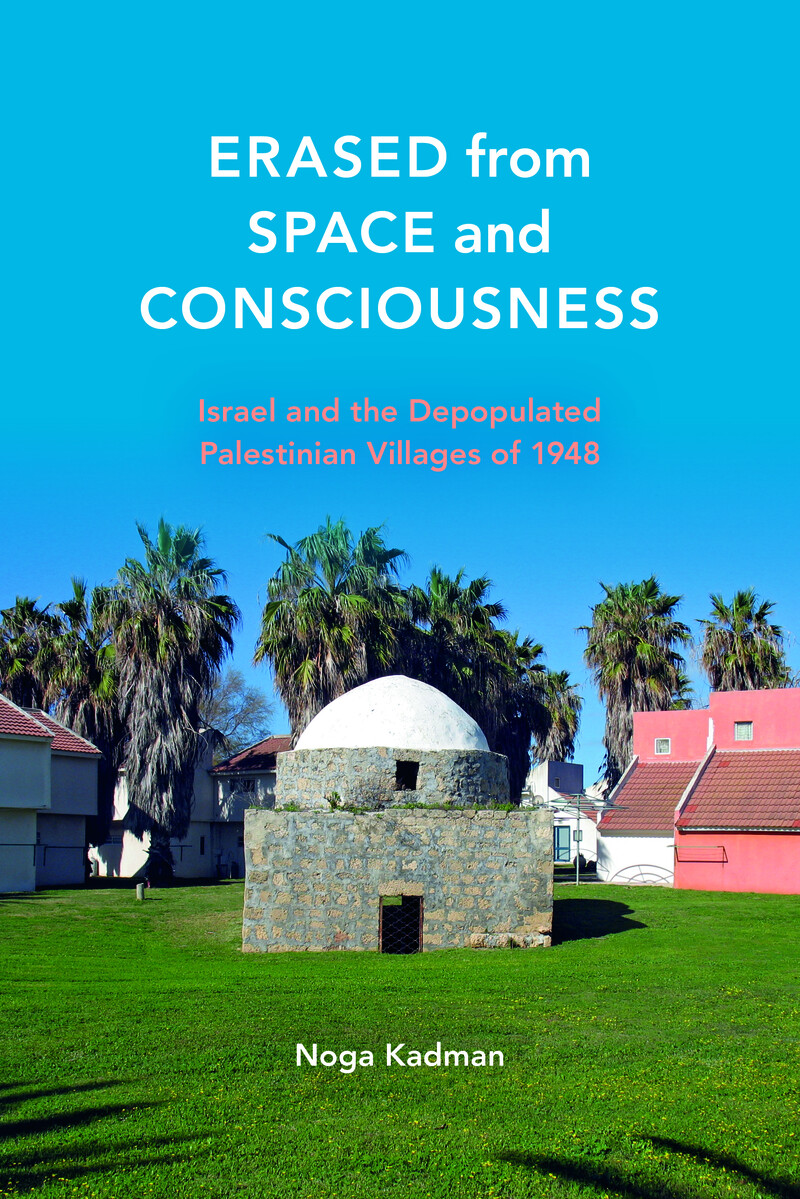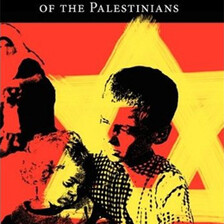The Electronic Intifada 28 December 2015

The task of identifying and preserving the memory of hundreds of Palestinian villages depopulated by Israeli forces since 1948 has been most famously taken up by Walid Khalidi.
Along with Salman Abu Sitta’s mapping of historic Palestine, Khalidi’s monumental volume All That Remains: The Palestinian Villages Occupied and Depopulated by Israel in 1948, published in 1992, remains the reference work for such a project.
Noga Kadman — an Israeli tour guide and researcher for rights organizations such as B’Tselem and Zochrot — has duly built on these studies to offer an analysis of how Israelis interact with and think about the remains and ruins the founding of their state created.
(Kadman does not include Naqab Bedouin communities in her study, or villages depopulated after the 1967 War. She acknowledges this a gap but, like Khalidi, sees it as a separate part of the project of recovering and remembering.)
Palestinians refer to 1948 and the establishment of the State of Israel as the Nakba (catastrophe). What is often forgotten with this designation is that the dispossession of Palestinians was not a singular event but one that spread over several years.
Kadman’s account of the massacres and intimidation by which Palestinian villages were depopulated follows that ethnic cleansing into the 1950s. It included what even an Israeli investigation admitted was “robbery on a massive scale” with members of the Zionist militia, the Haganah, stealing from the villages they emptied.
Kadman points out how various historical trends have shaped how Israelis view the homes, mosques, schools and other buildings which pepper their landscapes, acting as silent reminders of previous occupants.
Growing up with propaganda
Firstly, there are generational changes. The Israelis who remembered Palestinian inhabitants — and who forced them out in 1948 — have given way to descendants who never saw what these villages looked like as living communities and who have grown up only with state propaganda.
An illustration of this is the work of geographer Amnon Golan, who points out how early Israeli settlers, regarding olive trees as “enemy” agriculture associated with the “primitive” past, uprooted or abandoned them. By contrast, contemporary Israelis attempt to appropriate the remaining ancient olive trees as a symbol of longevity and authenticity.
Secondly, there is erasure of the villages themselves — sometimes by the processes of time, sometimes by intentional destruction and damage. Some villages, Kadman writes, were demolished for “security” reasons or used by the Israeli military for demolition and bombing practice.
The core of Kadman’s thesis is her study of Israeli documents, which examines the language and narratives employed to talk about depopulated Palestinian villages.
Her sources include internal newsletters and, later on, memorial books created by Israeli kibbutzim and moshavim — rural agricultural communities built on the lands of Palestinian villages, if not actually using homes and public buildings whose owners had been forced out or killed.
As Kadman puts it, “in 1954 more than a third of Israel’s Jewish population was living on land belonging to refugees, whose return no one intended to allow.” In towns and cities, Palestinian homes were likely to be expropriated by Israelis; in rural villages, they were in more danger of being demolished or neglected.
Occasionally, Kadman’s research shows, idealistic Zionists who established left-wing kibbutzim had misgivings about setting up home in stolen villages. But the majority of settler documents show that Zionist incomers either ignored their predecessors or labelled them as terrorists, calling villages “bases” for “Arab gangs” rather than places where communities had lived and thrived for centuries.
Written out of history
These dynamics, Kadman describes, continue in modern Israeli discourse. Drawing on documents such as brochures and websites about the “national parks” and tourist sites superimposed onto the Palestinian landscape, she demonstrates how the national project of denial and appropriation has seen Palestinians written out of history or maligned.
In the copious information available for Israeli hikers and visitors to national parks, hundreds of years of Palestinian history are ignored with reference only to ancient cultures such as Hebrews, Greeks and Romans.
If Palestinian villages are mentioned, the discourses employed are, again, those of “armed Arab gangs” during the 1948 war. On the rare occasions when Palestinian society and agriculture are mentioned, they are portrayed as primitive and even destructive, tying into Zionist narratives about the Jewish people’s intrinsic, natural links to the land. Driving Palestinian villagers out of their homes is justified by the idea that they were the interlopers, living on land which “yearned” for its “proper” inhabitants.
There are some jarring notes. In the introduction, Israeli academic Oren Yiftachel blames Palestinian society for its excessively “romantic” vision of the past and — citing the Holocaust — a nebulous Palestinian refusal to recognize the “millions” of Jewish “refugees” who form the population of Israel.
Kadman herself occasionally falls victim to this uncritical swallowing of the narrative that emigrants to Palestine were refugees rather than colonizers, and that Jews coming from the Arab countries were violently expelled. It is a very Ashkenazi narrative of Jewish identity, denying the different experiences of Middle Eastern Jews. It also ignores the Zionist role in exhorting Jews to leave countries such as Iraq and in driving wedges between Jewish communities and their Muslim and Christian neighbors.
In addition, Yiftachel and Kadman both perpetuate the idea that Palestinians, as well as Israelis, have refused to listen to and empathize with “the other side.” This analysis seems out of step with Kadman’s overall awareness of the power differential between Palestinians and Israelis — and ignores the fact that most Palestinians have no choice but to hear and be coerced by Israeli narratives.
This translation of Erased from Consciousness was published in 2015. The Hebrew original came out in 2008. This makes for occasional gaps, for instance where Kadman talks positively of Palestinian citizens of Israel commemorating the Nakba and other aspects of their past.
The time lag between the two editions means that she doesn’t then mention strenuous efforts by the Israeli state to criminalize and block — by financial and institutional means — exactly the kind of events she talks about.
Overall, however, this is an intelligent, well-researched and fluently translated (by Dimi Reider of +972 Magazine) book that casts new light on the ways in which the State of Israel and its institutions have tried to eradicate the memory of Palestinian habitation of Palestine and the social discourses and narratives which underpin this project.
Sarah Irving is author of a biography of Leila Khaled and of the Bradt Guide to Palestine and co-editor of A Bird is not a Stone.





Comments
Thanks and correction
Permalink Noga replied on
Thanks for an interesting review.
The accurate quote of Yiftachel is actually: "The Palestinian society, on the other hand, portrays a romantic image of a lost paradise, and (in part) refuses to recognize the millions of Jews who settled in Israel and created a new vibrant society on the same ruined Palestinian space." Nothing about Jewish refugees here.
And the fact is that most Jews who emigrated to Israel/Palestine from Europe were refugees or persecusions/holocaust survivors, and those from Arab countries had to leave, without their property (whoever's blame it was). Acknowledging that is acknowledging a complex reality, and has nothing to do with swallowing a Zionist narrative.
Jewish refugees
Permalink Ali Abunimah replied on
Hi Noga, thank you for writing. In light of your comment, I went back and checked the text of Yiftachel’s foreward in your book. The quote you provide is indeed accurate. However, just two paragraphs later Yiftachel writes:
well yes,
Permalink Noga replied on
Yes, he says that earlier - that people I quote in the book are often refugees themselves; he acknowledge the complexity of things here (without justifying in any way the atrocities). But he didn't criticize Palestinians for not recognizing "the 'millions' of Jewish 'refugees' who form the population of Israel," as attributted to him in the review, and he didn't mention the holocaust in this context. Yiftachel is far from being a Zionist, and being aware that holocaust survivors ending up in Israel were refugees - doesn't make him one.
Whatever she claimed of the
Permalink Blake replied on
Whatever she claimed of the Jews who went to Palestine had nothing to do with the Palestinians she should take that up with the relevant countries. Certainly was not a reason to condone the theft of Palestine.
However its not how she claims either.
"Any reasonable person, Zionist or non-Zionist, must acknowledge that the analogy drawn between Palestinians and Mizrahi Jews is unfounded. Palestinian refugees did not want to leave Palestine. Many Palestinian communities were destroyed in 1948, and some 700,000 Palestinians were expelled, or fled, from the borders of historic Palestine. Those who left did not do so of their own volition.
In contrast, Jews from Arab lands came to this country under the initiative of the State of Israel and Jewish organizations."
Hitching a Ride on the Magic Carpet - Haaretz
"In the absence of the European Jews [who preferred to go west], the state of Israel had to bring in Jews from Arab countries. Ben Gurion compared them with the Africans who were brought in as slaves to America."
- Israeli historian - Tom Segev, April 1998
There are many other sources but what she is claiming of Jews from arab lands is what they would term "cheap political point scoring" by the European (Ashkenazi) zionist elite.
Most Palestinians don't
Permalink Tareq Saleh replied on
Most Palestinians don't sympathise with jews as refugees simply because they acted as agressor colonial occu[iers than refugees, and also because Palrstinians had nothing to do with ww2 and its horrors.
Yiftachel's surprising attitude
Permalink Ab Hayeem replied on
I agree with Noga that Yiftachel is far from being a Zionist -knowing his very creditable work on the ethnic cleansing of the Bedouin from the Negev and Israeli policy on the unrecognised villages.Yet I still find his words as quoted in the foreword rather surprising -regarding the Palestinians not recognising the Jewish refugee and the background of a people living in the shadow of the Holocaust. It is for the colonisers to recognise their sins against the colonised.
Firstly, the established Zionist 'Yishuv' themselves looked at the Holocaust survivors with disdain, as not actively resisting the Nazis, ( ignoring the Warsaw Ghetto uprising) and of course knew they were deliberately dispossessing the Palestinians -as so eloquently described in 'Khirbet Khizeh" the novella of the 1948 war, by the Israeli writer S Yizhar who sought to preserve the memory of the Palestinian nakba. The subsequent agenda was to refuse to acknowledge the Nakba -instead insisting it was a tragedy 'from their point of view' -again as shown in Ariela Azoulay excellent discourse on Haganah photography of the Nakba trying to disguise the change "From Palestine to Israel". Notoriously this dispossession continues every day both in the OPTs and within 1948 Israel, and the old Zionist hasbara narrative being returned to with greater ferocity and unbridled racism.
but again,
Permalink Noga replied on
But again, Yiftachel didn't say anything in his forward about "the Palestinians not recognising the Jewish refugee and the background of a people living in the shadow of the Holocaust". You mix two different things he said. He said that part of the Palestinian society "refuses to recognize the millions of Jews who settled in Israel and created a new vibrant society on the same ruined Palestinian space". and earlier he talked about the colonizers as holocaust survivors, which many of them were. Understanding many of the colonizers were refugees themselves only gives us a deeper and more complex understading of the reality and history, even it doesn't go well in line of the clearcut dichotomy of "victims" and "victimizers".